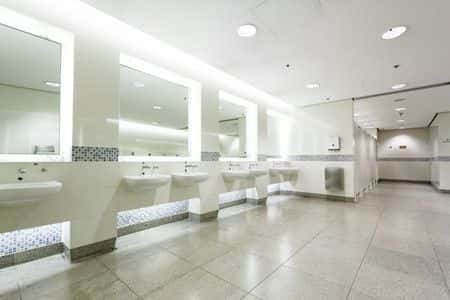Mechanical Engineering Expert Witness Advises on Slip and Fall in Retail Bathroom
Updated on
A mechanical engineering expert witness advises on alleged negligence from retailer’s slippery bathroom floor. The plaintiff is an elderly woman who was shopping at a large retailer. When she entered the bathroom, she was unaware the bathroom floor was wet because of a toilet leak due to a fill valve defect. She slipped, fell and fractured her hip.
She filed a negligence action against the store owner, alleging the bathroom floor should have been made of a slip-resistant substance or placed a wet floor sign. She also stated that the store personnel should have known that the area had the potential for wet, slippery floors that needed to be regularly monitored.
Question(s) For Expert Witness
1. What standards apply to retail establishments regarding floor safety?
2. Did the store violate those standards?
Expert Witness Response
 The floor had a coefficient of friction that increased the probability of customers slipping. American National Standards Institute / National Floor Safety Institute B101.3 provides the industry standards in regard to the suitable level of flooring tiles in interior spaces under wet conditions. ANSI B101.3 stipulates flooring tiles should have a wet dynamic coefficient of friction of greater than 0.42: in order to be safe (Lower probability of slipping). I conducted floor testing at this store on the tile flooring and the wet dynamic coefficient of friction of the flooring fell well under this standard, with the highest average value scoring only a 0.40.
The floor had a coefficient of friction that increased the probability of customers slipping. American National Standards Institute / National Floor Safety Institute B101.3 provides the industry standards in regard to the suitable level of flooring tiles in interior spaces under wet conditions. ANSI B101.3 stipulates flooring tiles should have a wet dynamic coefficient of friction of greater than 0.42: in order to be safe (Lower probability of slipping). I conducted floor testing at this store on the tile flooring and the wet dynamic coefficient of friction of the flooring fell well under this standard, with the highest average value scoring only a 0.40.
 The store created an unsafe condition by having unsafe flooring tiles in its bathroom where it was reasonably foreseeable they would become wet. The store did not take appropriate measures to correct the unsafe condition despite being in the position they knew or should have known this tile was unsafe when wet and did not take appropriate measures to ensure the tile did not become wet.
The store created an unsafe condition by having unsafe flooring tiles in its bathroom where it was reasonably foreseeable they would become wet. The store did not take appropriate measures to correct the unsafe condition despite being in the position they knew or should have known this tile was unsafe when wet and did not take appropriate measures to ensure the tile did not become wet.
 The store was aware its customers were likely to encounter this tile, as it was in the bathroom intended for customers, and it was reasonably foreseeable the tile would become wet. Despite this knowledge the store failed to make the flooring safe, and, as a result, the plaintiff encountered this unsafe condition and fell, causing life-changing injuries. Had safe flooring and measures to ensure the flooring did not become wet been in place, the plaintiff likely would not have suffered this fall.
The store was aware its customers were likely to encounter this tile, as it was in the bathroom intended for customers, and it was reasonably foreseeable the tile would become wet. Despite this knowledge the store failed to make the flooring safe, and, as a result, the plaintiff encountered this unsafe condition and fell, causing life-changing injuries. Had safe flooring and measures to ensure the flooring did not become wet been in place, the plaintiff likely would not have suffered this fall.
 The expert a mechanical engineer who is familiar with testing of fall sites and other industry codes. The expert specializes in engineering analysis of accidents, having conducted numerous investigations in premises liability cases.
The expert a mechanical engineer who is familiar with testing of fall sites and other industry codes. The expert specializes in engineering analysis of accidents, having conducted numerous investigations in premises liability cases.
About the author
Kristin Casler
Kristin Casler is a seasoned legal writer and journalist with an extensive background in litigation news coverage. For 17 years, she served as the editor for LexisNexis Mealey’s litigation news monitor, a role that positioned her at the forefront of reporting on pivotal legal developments. Her expertise includes covering cases related to the Supreme Court's expert admissibility ruling in Daubert v. Merrell Dow Pharmaceuticals Inc., a critical area in both civil and criminal litigation concerning the challenges of 'junk science' testimony.
Kristin's work primarily involves reporting on a diverse range of legal subjects, with particular emphasis on cases in asbestos litigation, insurance, personal injury, antitrust, mortgage lending, and testimony issues in conviction cases. Her contributions as a journalist have been instrumental in providing in-depth, informed analysis on the evolving landscape of these complex legal areas. Her ability to dissect and communicate intricate legal proceedings and rulings makes her a valuable resource in the legal journalism field.
Subscribe to our newsletter
Join our newsletter to stay up to date on legal news, insights and product updates from Expert Institute.
Sign up nowFind an expert witness near you
What State is your case in?
Subscribe to our newsletter
Join our newsletter to stay up to date on legal news, insights and product updates from Expert Institute.



